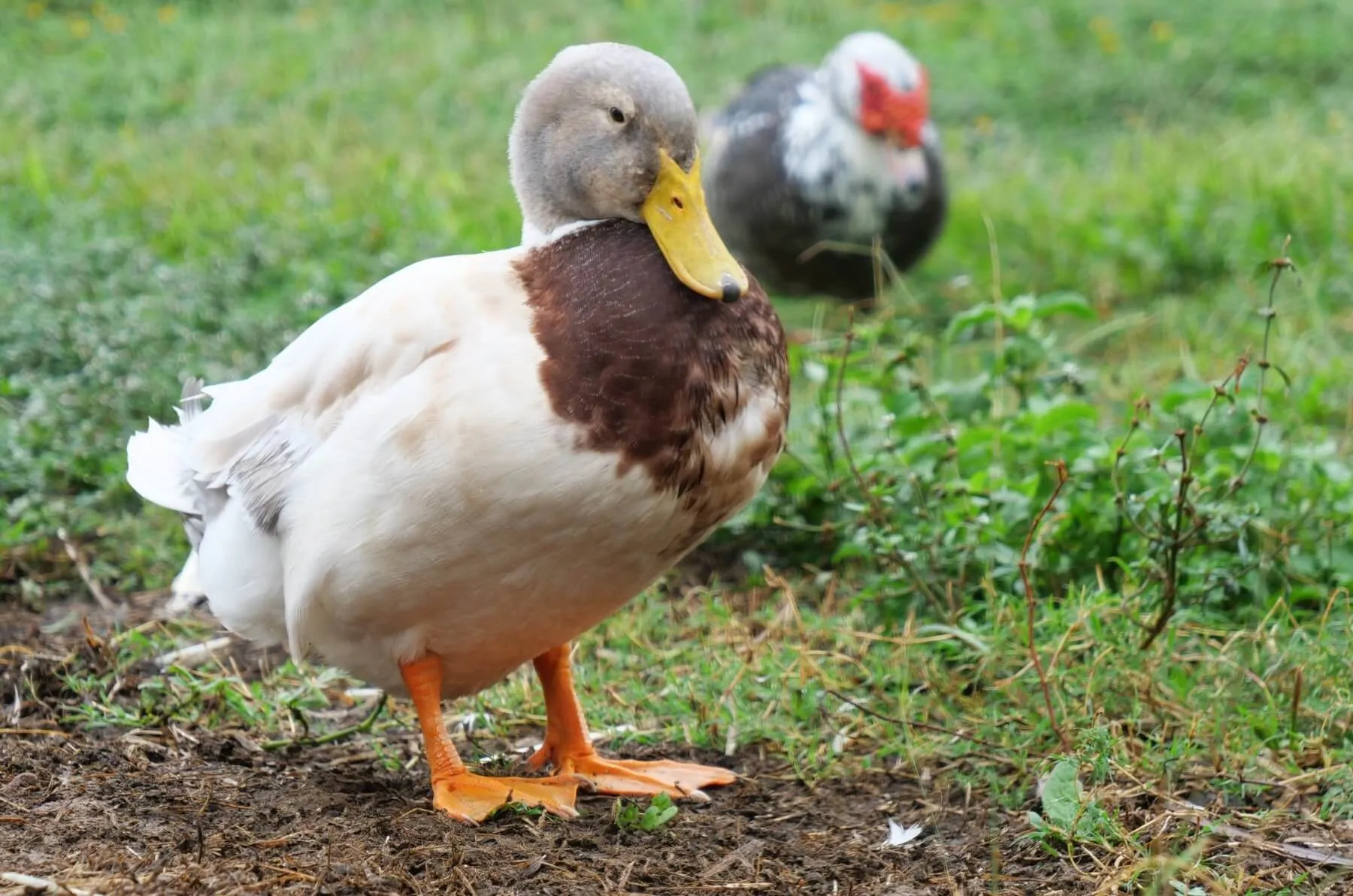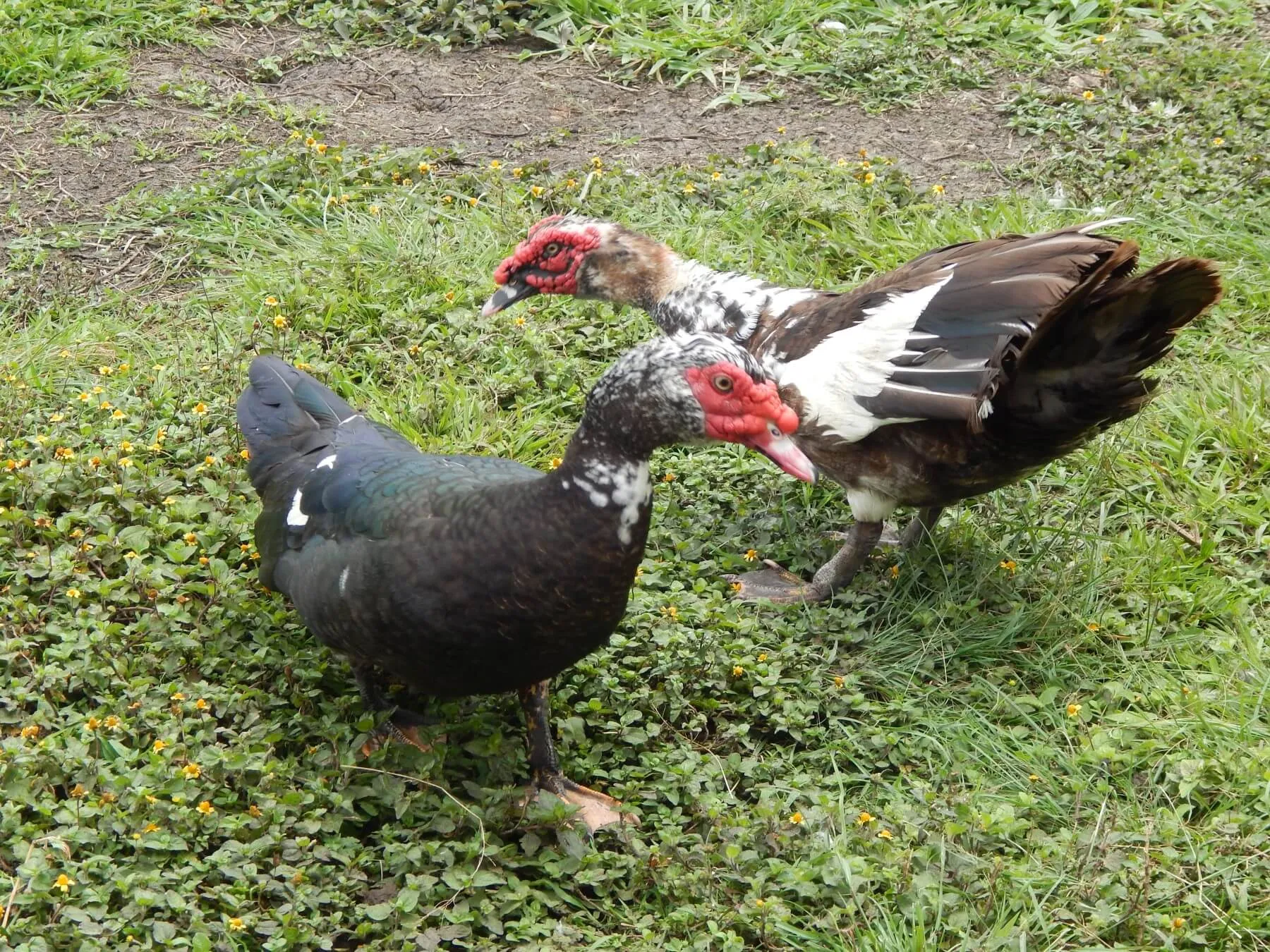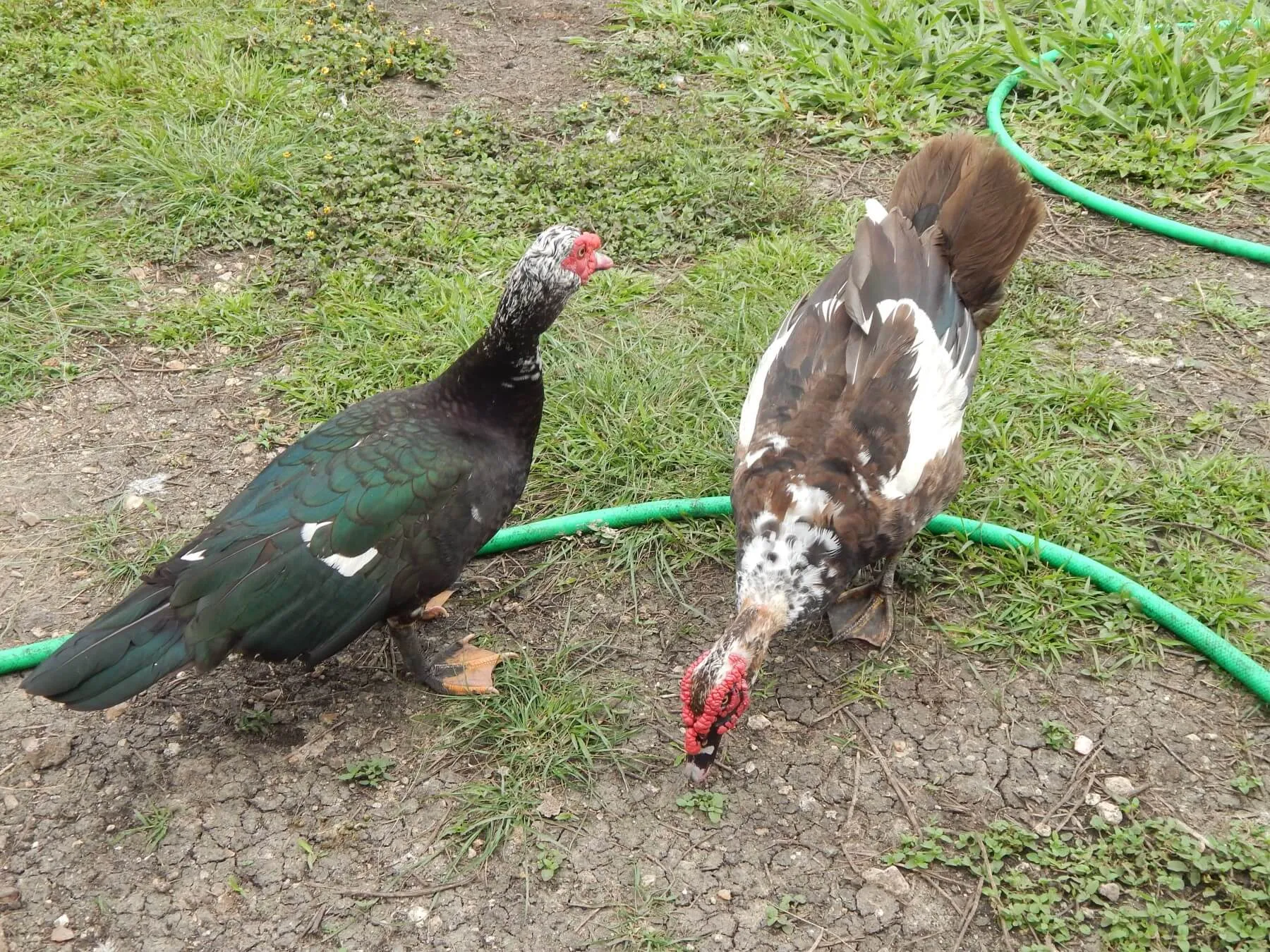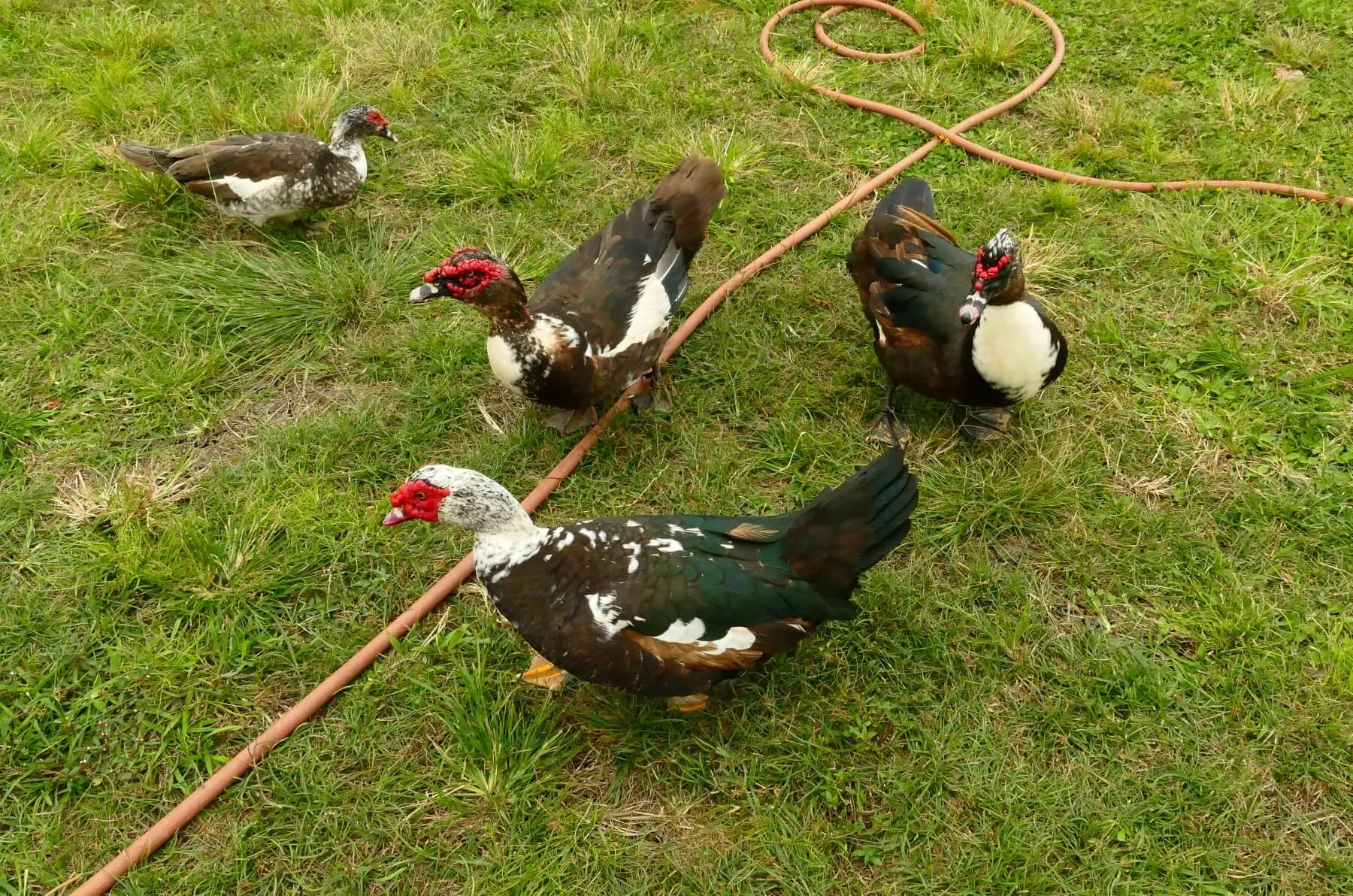You’re wondering how you can walk in your yard without Mr. Macho tearing a gash in your leg with his razor-sharp talons and leaving nasty bruises with his hard, twisting bite. You don’t want to resort to inviting your beloved drake for dinner. Neither do you want to become the subject of the next viral YouTube video if your neighbors catch you facing off a little 12-pound duck in medieval armor.
You know he’s just a puny little bird, but you’re kinda scared of him. Nothing seems to make him stop.
Don’t give up. Drakes may seem to be mindless maniacs, but there’s a secret to get drakes to stop attacking and biting people.
We can deal with this in a way that your drake naturally understands. All good animal trainers do this. Anyone who seems to get along with animals naturally, whatever the species, is able to because they understand the animal — how they think and why they do what they do.
Also, a quick apology to all non-Muscovy owners: So far, I’ve only had aggressive Muscovies. I have no real life experience with aggressive drakes of other breeds. Most of this information applies to both Muscovies and Mallard-derived breeds, but it’s possible there are differences I am not aware of.

Kermit, one of my drakes.
Why ducks are aggressive
There are two causes of drake aggression. Both are unacceptable.
- He’s attempting to assert his dominance, or…
- He wants to mate you.
I know the latter one sounds kind of weird, but it happens, especially if he was hand-raised and wasn’t around others of his kind when growing up. Without any females, some male ducks turn to humans in an effort to vent their sexual urges, and their attention often resembles an attack. Some drakes will do it even if they do have females.
This article is focused on the former (the more common cause of aggression). If your drake is “attacking” you because he wants to mate, the best solution is to get more females (preferably at least three females per drake). And then don’t let him attack you. Read about method #3 in “Techniques to stop aggression,” and then read “Where many people go wrong” to be sure you succeed, especially this part (which explains why method #3 works better for sexually aggressive drakes than for dominant drakes).
Most likely, however, he just feels that he is the boss. As he sees it, you are constantly violating the boundaries he has set for you by invading his territory and threatening to steal his girls, so he feels compelled to keep defending himself.
Many people wonder, “Will he stop his aggression on his own? Will it end if I just ignore it?”
No, probably not. It won’t end unless you do something to change the hierarchy.
Ducks use a “pecking order,” or a hierarchy of who is boss over who. Ducks find out who is where in the pecking order through fights. Sometimes they’re just small skirmishes, other times they’re full-blown battles. Both females and males have these fights, but they’re usually far more serious in males.
It’s usually only males who try to dominate humans. Your drake sees you a part of this pecking order or social hierarchy.
Some people are naturally assertive and capable of subtly commanding respect with their mere presence and body language. Drakes will usually realize that these people are indisputably the top drake and likely won’t even try to challenge them.
Many people, however, inadvertently encourage their drake to dominate them.
How aggression starts
In many cases, aggression starts the day the duck hatches, warm in the hands of a loving family who ooh and aah over his cute face, tenderly stroke his oh-so-soft yellow down, giggle when he “kisses” them on the cheek, feed him a steady stream of treats, and laugh as they watch him waddle across the room after them.
Yes, aggression problems often start when humans imprint a drake onto themselves and raise the drake as a pet.
Now, there’s nothing inherently wrong with that. Ducks of either sex can make great pets.
But you have to be careful. First of all, those are not cute “kisses” or love pecks. That’s anthropomorphization. They’re dominance pecks. (Sometimes it’s just curious nibbling, like at glittering buttons or shiny eyes, but that’s different from a peck.) Ducks take pecking seriously. If you allow it, you will confirm to him that he’s alpha. When he’s young, it will seem harmless.
But then he matures. He decides it’s about time you start listening to him. He’s bold, he has no fear or respect for you, and he’s been king of the house his whole life. Naturally, he feels dominant, and feels compelled to maintain his place in the pecking order by asserting his dominance.
How do you prevent this?
If you’re reading this article because your drake is already aggressive, read this section anyway, because you don’t want to continue encouraging the behavior while simultaneously trying to stop it.
First, I really don’t recommend imprinting a drake onto yourself. (On a related note, neither do I recommend raising a lone duck. You can’t be around 24/7 and he’ll be lonely when you’re gone.)
Second, don’t let him peck or bite you. If he’s trying to demand for you to give him treats, don’t reward the biting by giving in and offering the treat. Peck him in return with your finger until he moves away, even if you have to make him. That’s just duck manners. A duck who taps or lightly pecks another duck, usually on the shoulder, is saying, “Move out of my way,” and if he doesn’t move on his own, it’s because he thinks you have no right to boss him around.
Third, most people like to feed their pet ducks by hand. I do, too. I won’t condemn hand feeding, but many drakes don’t let subordinate drakes eat their food or any food in their territory. There are some drakes that are more easygoing and will allow it anyway, so long as the subordinate drakes still maintains respect, but if you begin to see problems, I recommend not hand feeding your drake or letting him eat while you are standing over the food bowl. For some drakes it might not be a problem, but for others, it could reinforce the notion in his head that he is dominant.
Many aggressive duck cases are lone drakes raised in a house and imprinted onto humans, but sometimes a drake will turn aggressive even if you’ve never fed him by hand or any such thing.
In these cases, it’s usually a drake who isn’t sure who’s who in the pecking order, and decides to find out by challenging you. Many people don’t recognize the challenge, and it escalates into pecking or even a full-blown attack.
Startled, the person doesn’t know what to do and moves or even flat-out runs away. “Ha!” the drake thinks. “I win! They surrendered! I’m boss!”
Congratulations! You have now taught your drake that you move away if he tells you to, and, thus, he is dominant.
Now let’s find out how to actually stop the behavior.
Techniques to stop aggression
Well, you could just wear that medieval armor. You’ll be a literal knight in shining armor. It would probably even would work. He’d probably spook at the weird shiny monster.
If you’ve already received any advice, it was probably one of these:
Pet him. Give him treats. He will realize that you are not a threat.
Kick him! Whomp him! Whack him with a stick!
Carry a broom/bucket/other object to block his attacks.
Show him you’re boss! Put him in his place!
#1 seems to pacify some drakes, but it rarely permanently solves the problem. In fact, it can actually aggravate it, because, as I mentioned before, subordinate drakes aren’t normally allowed to steal a higher drake’s food.
#2 does technically “work.” Some people endure aggressive ducks/geese/roosters for months and finally, in a burst of anger and frustration, just kick the bird away. Voilá! No more aggression. However, I don’t recommend it. It’s rather mean, and you could injure him. Also, the only thing it accomplishes is teaching your drake that you’ll hurt him, and thus causes him to fear you, which you especially don’t want if he’s a pet. There’s a better way.
#3 can work or at least help, but it takes a while to get through their heads that they are not capable of getting past the broom. Sometimes, they will merely switch to attacking the broom. Or they will stop attacking—so long as you have the broom. So for the rest of his life, you will have to carry a broom with you every time you’re around him.
#4 is the one that works, 100% of the time, because it’s something that drakes innately understand. A drake will not attack a more dominant drake. But the way you do it matters—and many people do it wrong.
Have you ever seen two drakes fighting?

Two Muscovy drakes challenging each other.

It will start with a challenge from one drake to the other, often a peck. Sometimes (in Muscovies, at least) they’ll walk side by side, dipping their head to the ground and up again, until one of them finally charges in to attack.
In Muscovy ducks, this sound, along with the raised crest, is a territorial warning or a challenge to fight:
Once they start fighting, they’ll jump and dance, beating each other with their wings, trying to pin the other down.
At some point, (unless the two competitors are so evenly matched that neither can win) one of the drakes will succeed in pinning the other down. He’ll stay there, sitting on top of the other, usually pecking at his neck or shoulders, for several minutes. Eventually he’ll get off, and the loser will run away while the winner gets congratulated on his victory by his girls.
And from then on, the guy who won is top duck (at least until he’s challenged again).
Simply put, to put a drake in his place and become alpha, you have to mimic this kind of fight.
Skip the wing-beating. You’re stronger than him. In a fight between two drakes that are not evenly matched, they often go almost straight to the pinning part. So should you. Just pin him down and hold him there. You can sit on him, but don’t put all your weight on him, obviously. Just don’t let him get up. Flatten his head and neck to the ground. You can even “peck” at him for good measure.
After a few minutes, let him go. That’s all there is to it (well, almost).
Here’s a video of someone doing a demonstration with a mildly aggressive Pekin:
Where many people go wrong
You may have already heard the above advice. You may now be thinking, “I did that! It doesn’t work!”
The reason it didn’t work is probably because you backed off. Either you back off or he backs off. You can’t give up before he does!
You’ve gotta be consistent and determined. You have to mean what you say. You can’t give up. They figure out pretty fast whether you’re bluffing or not. If he comes right back at you, just do it all over again. If you can feel he’s still fighting and trying to hold his head up and get out of your grip, don’t let him go. Only when he feels like he’s given in and is lying there submissively should you let him go. Hold him for at least two full minutes, just like a drake in real life would do. Thirty seconds of pinning probably isn’t even going to work. After all, you didn’t engage in a real wing-beating fight, so it may take longer for him to understand your reason in pinning him down.
You will likely have to do it multiple times. Patience, persistence, and consistency are key. Just keep at it. It’s not necessarily going to stop overnight.
Equally important: never back up or run away from him, because that just encourages him and proves to him that you are below him. That’s what he wants you to do.
Every single time he tries to attack you, you are going to retaliate and pin him down. It must always be this way. It’s not a rule if you only enforce it half the time!
It’s that simple. Leadership requires clarity, consistency, and communication.
Often I hear the complaint, “But I don’t want to hurt him!” Some people only half-commit and try to kind of gently hold him down, like he’s made of wet cardboard. He isn’t. Hold him down good and tight. Put some force behind it. If you’ve pinned him multiple times and are not getting results, you’re probably not being insistent enough.
Some people also try picking their drake up and carrying him around. I think the pinning is the best because it’s what another drake would do to him, but feel free to experiment.
It may seem harsh, but keep in mind that what you will be doing is hardly different from what another drake would do. He doesn’t see it as cruel; he just sees it as part of life. Remember, also, that it’s far kinder to treat him like this a few times than to have to put him down.
There’s also no need to worry that he will feel miserable and forlorn if you’re above him in the pecking order. It won’t break his spirit. He’ll accept it and then he’ll go on living his ducky life the same as he did before. He’ll just have a new respect for you.
He’s not necessarily going to hate or fear you, either. A bit more on that here.
If you absolutely don’t want to do this, you can try method #3. I’m not guaranteeing that it will work, but some drakes do give up after being met with a broom every time they try to attack. I don’t mean hitting him with the broom, just placing it as a blockage, or lightly shoving him away with it. You can also use a back scratcher, short PVC pipe, a piece of cardboard, or even a water gun (many ducks hate being sprayed with a water gun).
However, if you’re struggling with a sexually aggressive drake, one that is interested in mating you, the broom technique is actually the best. There’s no point in winning a dominance fight with him, because he doesn’t even think you’re a drake. Get him some girls to keep him happy, if at all possible, and then block all his attacks. Eventually he may give up when he realizes that you are an impossible target.
A few other tips:
If you are actually afraid of him, remember that all he can really do is bite. Drakes are much less dangerous than aggressive roosters. Just wear jeans and closed-toe shoes. Some very aggressive drakes may actually pounce and attack with their bill, wings, and claws, but still, with some tough jeans and boots, he really can’t hurt you. Really. He’s a featherweight.
Don’t randomly chase him or whack him or anything like that. He won’t understand. Only get physical with him as an IMMEDIATE response to aggression, and you must do it in the same way he would do it to another drake. Timing is very important in training any animal, because you can’t actually tell them why you’re doing it.
Don’t get angry and don’t take it personally. He’s just doing what his instincts tell him to do. Try to stay calm.
Is there ever a drake that absolutely refused to change his mind and could not be convinced? I don’t know. Some drakes are stubborn and won’t easily relinquish their title of “boss duck,” but I don’t think that means he’s a lost cause. If you’ve tried and tried and are not getting anywhere, I’d be pretty certain you were doing something wrong unknowingly. But I’d be willing to consider that he could indeed be beyond hope.
But I don’t want my drake to hate me
Many people are worried that if they “show him they’re boss,” their drake will fear them and run away from them. Not necessarily! If you’re mean and nasty, he might stay away because he’s afraid, which is better than him attacking you, but if he was your pet, you probably don’t want him to be fearful of you. Just respectful. That’s all you’re asking for.
I currently have five Muscovy drakes. Their pecking orders have switched around a few times over the years, but right now, King’s the boss. BB’s second, Captain’s third, Edward’s fourth. Little Eli is on the bottom, fifth.
But you won’t see Eli cowering and running every time he sees a drake lumbering on the horizon.
In fact, guess what?
Captain and Eli are best buddies. They take naps in the shade together, they talk together, they follow girls around together. Once in a while, Eli will challenge Captain. They’ll have a short fight. Captain will win, since he’s bigger and stronger. And then everything will be fine and dandy again.

Three of my drakes.
Not every drake will be like this, unfortunately. Captain’s the type of guy to get along with everyone, and Eli took advantage. Some drakes will simply run if they see other drakes that are higher in the pecking order. I don’t know why, maybe they’re just more fearful by nature. Edward is like that. The other drakes don’t bully him, but he still acts terrified. (Frankly, it seems like he panics if you even look at him funny.) And sometimes drakes will be bullies and not let subordinate drakes anywhere near.
So even if you’re “top duck,” it doesn’t automatically mean he will see you as a heartless monster and skedaddle every time he even thinks he smells you. With most drakes, you will still be able to get along, especially if you make an effort to still be buddies with them.
When culling IS the best solution
There ARE times when I would recommend getting rid of a drake.
If your drake is a beloved pet…
*all devoted, infatuated pet drake owners suck in a breath of living horror*
If your drake is a beloved pet, I have bad news: You shouldn’t keep him.
Just kidding. You can keep him.
Most “pet” cases are caused by the owner, rather than genetics, and thus can usually be fixed, as hard as it may be for the doting owner. If he seems truly hopeless (which I doubt) or there is an acute threat of him harming a child or something, or if you just don’t want to take the time to deal with it, you may want to find a more peaceful drake, but it’s your choice.
However, if you have not done anything to encourage aggression and your drake is just plain mean and nasty, it may just be his genes. Yes, you can probably teach him not to attack you, so you can keep him if you really want to. I just don’t recommend breeding him. “Cull” does not necessarily mean “kill.” It just means to remove from the breeding population.
Anyone who is breeding their ducks, especially if they often sell to people who want ducks for pets, should be careful to only breed friendly animals.
There are also the drakes who not only dominate, but flat-out bully other drakes. Some drakes are happy to live peacefully with other drakes, so long as there are plenty of girls to go around. Others, however, chase, beat up, and bully subordinate drakes for no reason. These are likely that way just because it’s in their genes, and these should be culled from your breeding flock, or, at the very least, removed from other drakes.
My drake, Captain
Captain was one of my first drakes. He was babied and loved, coddled and kissed, handfed and petted, and lavished with attention and treats. I was new to ducks and knew very little.
I remember he did peck me. I thought it was just cute. He had no fear—and also no respect—for humans.
I don’t remember exactly how the aggression started, but at some point he came after me and bit me. I’m pretty sure I jumped away.
From then on, he knew he was boss and he told me so, every time I got near him. Sometimes I would get out of his way before he bit. Other times I would try making him stop it. I tried so many things. I swatted him with a stick, I shoved him with my foot, I held his bill shut, I dumped water on his head (ha, ha. He’d just stand there hissing), and I even tried pinning him down.
And then as soon as I finished pinning him (after maybe fifteen seconds?), I moved away before he could bite again. Clearly, I was not very determined or consistent.
I think the craziest thing I tried was putting a bucket on his head. (I was a kid!) It had zero effect on the aggression.
Fortunately, he wasn’t the type to come flying towards you and attack you with wings, claws, and bill. He’d mostly just bite, and that was only if you stayed near him and refused to move away.
So I just stayed away from him!
He was boss and he was happy with it. I was not boss and learned to live with it.
Then, a couple years later, I became interested in horse and dog training. I noticed that the good trainers had things in common. They emphasized how behavioral problems were usually the owner’s fault and not the animal’s, how you had to be consistent, how you should never ask for something without making sure you got what you asked for, how you had to understand how the animal thinks, and so on.
In addition to that, I got two new drakes and was able to witness what a real fight looked like and how the top drake maintained his position in the pecking order. I also read some online about defeating aggressive drakes.
So I went out and did the pinning thing with Captain. I think I did it three times. That was the end of his aggression.
He still likes me. I can walk up to him and pet him any day. But he’ll also get out of my way if I lightly “peck” him. We get along well.
Recap
Your drake attacks you either because he thinks he’s boss, or because he wants to mate you.
For the latter problem, give him more females, and then teach him that you are not an acceptable target by blocking all his attacks with a broom or other similar object.
For the former, put yourself above him in the pecking order by simulating a fight like he would have with another drake. When he tries to attack you, pin him down and hold him down for at least two minutes, and longer if he’s still struggling. Repeat if necessary.
Be consistent and determined. Don’t give up. Never let him win a fight and never back down. Don’t bluff and don’t say anything you don’t mean.
Once he realizes you are dominant, he won’t attack you.
And I wish you success in having a happy, healthy, respectful relationship with your drake.
Leave a comment
Your email address will not be published.